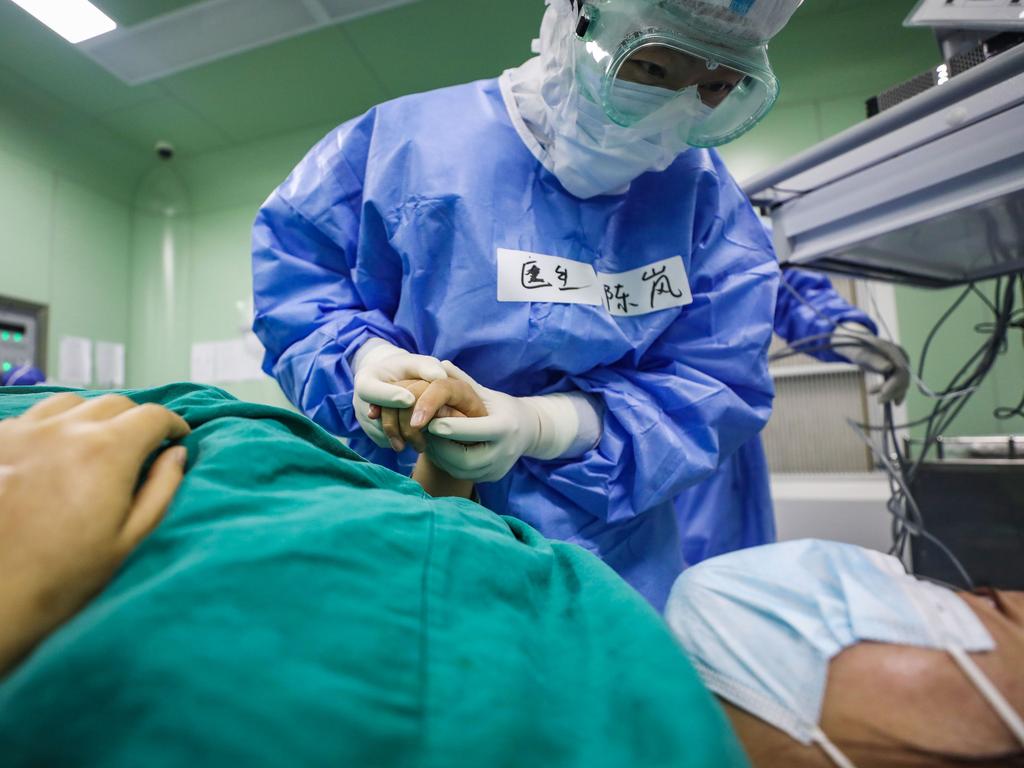Coronavirus: Pregnant women should self-isolate
An obstetrician that has been delivering babies for 30 years has advised pregnant women to consider extreme social distancing measures.
Pregnant women should minimise contact with others and avoid the workplace as much as possible amid the coronavirus outbreak, an obstetrician has said.
Professor Steve Robson, an obstetrician on the Australian Medical Association Federal Council who has been delivering babies for 30 years, said pregnant women should “minimise contact, social contact, contact with others, workplace contact”.
“What we know globally is the more action you take the earlier on, the safer it is for society and our communities and our families,” he told news.com.au.
“I think you could make a very good case for saying if at all possible, if you are pregnant you need to minimise contact, social contact, contact with others, workplace contact, as much as you possibly can.
“I’ve seen a lot of pregnant women this morning for visits, we are encouraging them to work from home if at all possible and don’t travel around and shop if they don’t have to.
“I think the lessons we are learning here is to be very aggressive in the way that people try and minimise that exposure, minimise that risk as early as possible.”
RELATED: Follow the latest coronavirus updates
RELATED: What are the coronavirus symptoms?

“Even if you don’t have symptoms and even if nobody in your house has symptoms there is still more that we need you to do,” he said.
“Second now is the time for everyone to stop non essential contract with others.
“We need people to start working from home where they possibly can, and you should avoid clubs pubs theatres and other such social venues.
“This avoiding all social contact is especially important for the over 70, pregnant women and those with health conditions.”
Prof Robson moved to reassure pregnant women.
“I think one of the key things we know is that pregnancy is a time of anxiety and concern. It’s been quite difficult to get a lot of information about the true risks (from coronavirus) to women when they’re pregnant,” he said.
“The information that we do have suggests that if you’re pregnant and you get coronavirus you probably at this stage won’t get it more severely than anybody else but that doesn’t mean that you can’t get it quite severely.”
RELATED: Can I boost my immune system?
RELATED: Do I have a cold, flu or coronavirus?
Australia’s chief health officer Brendan Murphy was also asked if pregnant women should self-isolate to avoid catching the virus.
But Prof Murphy said that the common flu was of more risk to pregnant women than coronavirus.
“I don’t think you can self isolate for the whole of the pregnancy,” he told reporters in Melbourne.
“Anyone who is pregnant, as a matter of principle, obviously pays close attention to their health and they will try and not, avoid contact with someone who has any infection.
“Influenza is to be more dangerous for a pregnant woman than coronavirus. The evidence we have seen with coronavirus so far, and that is limited evidence from China, is those pregnant women who have contracted it had a mild disease and it has no significant impact on the foetus. But every pregnant woman takes the health seriously.”
In a statement RANZCOG, the peak body for obstetrics and gynaecology and women’s health in Australia and New Zealand, said that information on “the impact of COVID-19 infection on pregnant women and their babies is limited by the recency of the disease emergence”.
“Therefore, our pregnancy advice is based on learnings from influenza infection, and also the medical response to the SARS epidemic in 2003,” a statement from RANZCOG said.
“By way of comparison, influenza is a potentially serious disease for pregnant women, the fetus and newborn babies. 
“A number of changes occur to a woman’s body during pregnancy. These changes include reduced lung function, increased cardiac output, increased oxygen consumption, and changes to the immune system. Due to these changes, pregnant women have an increased risk of severe complications from influenza.
“However, at this time, pregnant women do not appear to be more severely unwell if they develop COVID-19 infection than the general population. It is expected the large majority of pregnant women will experience only mild or moderate cold/flu like symptoms.”




